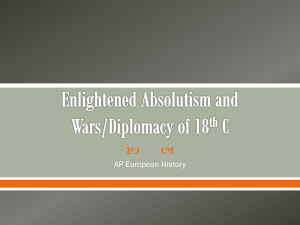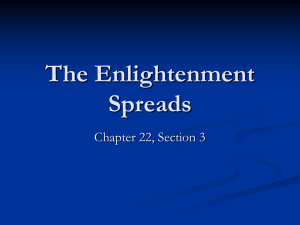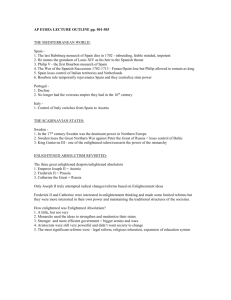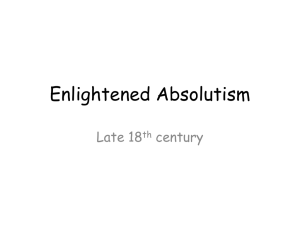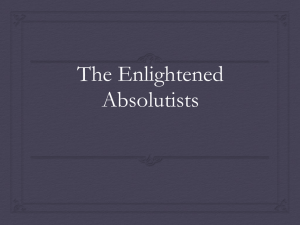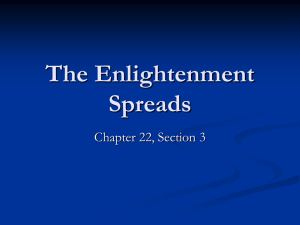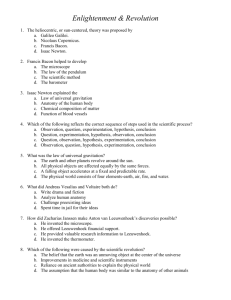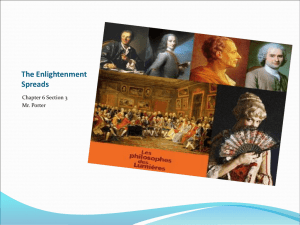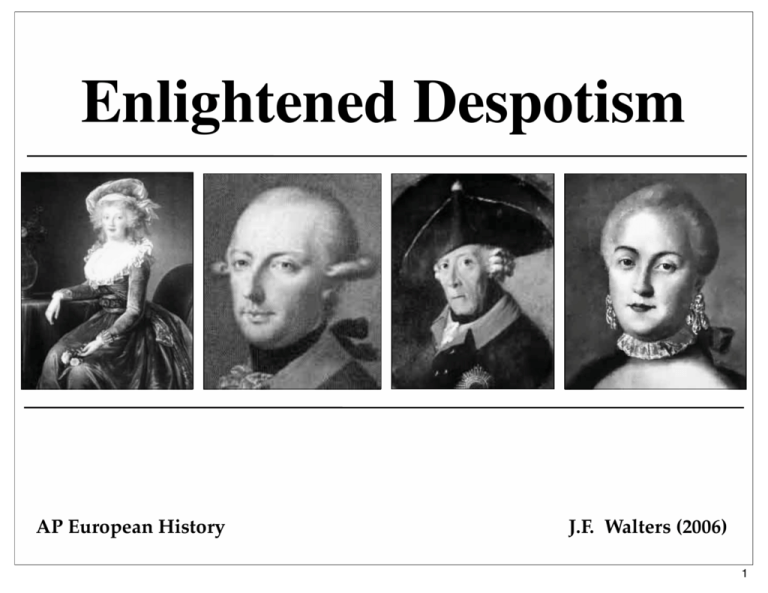
Enlightened Despotism
AP European History
J.F. Walters (2006)
1
Enlightened Despotism: Essential Questions
1. What were the general characteristics of Enlightened Despotism?
2. How was Joseph II both enlightened and despotic?
3. How was Frederick the Great both enlightened and despotic?
4. How was Catherine the Great both enlightened and despotic?
5. Which of the enlightened despots appears to be most attuned to the spirit of
the Enlightenment?
AP European History • Enlightened Despots • J.F. Walters
2
Enlightened Despotism
Journal 36: The typical enlightened despot set out to reform and reconstruct the
state in order to make it more rational and more uniform.
––Palmer Chapter 36 • pp. 311-20––
Directions; Using sentences or detailed bulleted notes, identify & explain the evidence Palmer uses to support the thesis listed above.
AP European History • Enlightened Despots • J.F. Walters
3
Enlightened Despotism: Terms
• despot: a ruler with absolute power
• Enlightenment: intellectual period of the 18th
century based on the idea that society could be
improved by the use of reason
• Enlightened Despotism:
✓ grew out of earlier period of absolutism (Louis XIV, Peter the
Great, Charles I, etc.)
✓ change in attitude: acceleration of old institution of monarchy
without the religious buttress (did not justify on grounds of
divine right). Enlightened despots sought to justify
themselves in the light of reason and secular usefulness.
AP European History • Enlightened Despots • J.F. Walters
4
Characteristics of Enlightened Despotism
• secular
✓ claimed no mandate from heaven (no divine right justification)
✓ recognized no responsibility to god or church
• rational & reformist
✓ typical enlightened despot set out to reconstruct his/her state by the use
of reason
✓ impatient of custom (all referred to as “feudal”)
➡ customary law
➡ traditional rights and privileges of nobles, church, judicial bodies, etc.
• methods
✓ uncompromising & abrupt: wanted change and wanted it immediately
✓ contradictory: Enlightened Despots were comfortable with contradiction
➡ selected certain enlightened ideas and denied others as they sought fit for their
monarchy and state
➡ could be enlightened in some ways and despotic in others
AP European History • Enlightened Despots • J.F. Walters
5
Maria Theresa––Austria
Enlightened Accomplishments:
• nobles paid heavier taxes
• weakened the influence of the
Catholic Church!
✓ subjected Church to higher taxes
✓ nationalized monastic property
✓ expelled Jesuits
Despotic Ways:
• banned works of Voltaire &
Rousseau
• banned the Papal Index (did not want
Maria Theresa
forbidden books to arouse curiosity in her
subjects)
1740-80
AP European History • Enlightened Despots • J.F. Walters
6
Joseph II––Austria
Enlightened Accomplishments:
• expanded religious toleration
✓ granted full toleration to Lutherans,
Orthodox Christians & Calvinists
✓ improved the lives of Jews
➡ freed from Vienna’s ghetto
➡ exempted from discriminatory taxes they
had been paying
➡ lifted the requirement of wearing yellow
badge as a sign of inferiority
• freed the serfs
✓ abolished obligations to manorial lords
✓ deprived nobles of their traditional
right to administer justice to peasantry
Joseph II
1760-90
AP European History • Enlightened Despots • J.F. Walters
7
Joseph II––Austria
Enlightened Accomplishments (cont’d):
• believed in popular education & social equality
✓ provided teachers and textbooks for
primary schools
✓ more than 25% of school age-children
attended school
Despotic Ways:
• practiced mercantilism
✓ high protective tariffs
✓ government closely supervised economic
activity
•
Joseph II
absolutist in terms of government
appointments
1760-90
AP European History • Enlightened Despots • J.F. Walters
8
Joseph II & the Jews: Reflections On
“Joseph’s removal of a great range of legal disabilities from the Jews is
one of the changes for which he was most revered, with Galician Jews
for generations seeing Joseph as one of the great figures in their
history...Some of these disabilities were so grotesque that it is hard to
engage with the idea that they ever existed. Jews could now remove the
yellow star from their clothing, move freely around the Monarchy, open
their own factories, employ Christian servants, and attend universities
and visit theaters. They were also permitted to leave their homes on
Sundays and on Christian festivals, bans previously in place on the
grounds that as Christ’s murderers it was offensive for them to be seen
in public. These changes inaugurated a new and powerful relationship
between the Habsburgs and the Jews which ultimately resulted in the
greatness of Central Europe’s late-nineteenth-century culture. Joseph’s
motives, however, were as usual to do with efficiency––he wished to
make Jews into fully productive citizens and he wanted them for his
army. There was also the usual sickness that accompanied all Habsburg
thinking about Jews. As a Catholic, Joseph believed that the Jews’
adherence to their faith was the result of their legal disabilities. Once
they were in the mainstream, took German names and were taught
German at school they would cease to be Jews.”
Source: Danubia: A Personal History of Habsburg Europe, Simon Winder (New York: Farrar, Straus and Giroux, 2013), pp. 265-66.
AP European History • Enlightened Despots • J.F. Walters
9
Frederick II (the Great)––Prussia
Enlightened Accomplishments:
• general
✓ attentive reader of philosophes
✓ brought Voltaire to Prussia
✓ wrote pamphlet arguing the immorality of
Machiavelli’s The Prince
✓ composed music
• economic
✓ after Seven Years’ War gave peasants tools,
stock and seed to repair ruined farms
✓ encouraged agricultural improvements
➡ drained swamps, began crop rotation and
introduced iron plow
➡ imported new crops: clover, potato, tobacco
Frederick the Great
1740-86
AP European History • Enlightened Despots • J.F. Walters
10
Frederick II (the Great)––Prussia
Enlightened Accomplishments (cont’d):
• religious: some religious toleration
✓ invited expelled Jesuits to predominately
Lutheran Prussia
✓ gave Catholic minority virtually full
equality
✓ boasted that he would build a mosque in
Berlin if Muslims wanted to settle in
Prussia
• judicial reforms
✓ freed courts from political pressures
Frederick the Great
1740-86
✓ ordered a reduction in use of torture
✓ set up a system of appellate courts
AP European History • Enlightened Despots • J.F. Walters
11
Frederick II (the Great)––Prussia
Despotic Ways:
• hostile to doctrine of laissez-faire
• levied taxes on Jews and tried to exclude
them from the professions and civil service
• did not loosen the bonds of serfdom (although
he did abolish it on royal grounds)
• urged education to peasants, but only to
become literate enough for his own needs
(not enough to be discontented with their lifestyles)
• after Seven Years’ War he forced all
bourgeois officers to resign their
commissions
• business and professional men were exempt
from military service but subject to heavy
taxation
Frederick the Great
1740-86
AP European History • Enlightened Despots • J.F. Walters
12
Frederick the Great: Reflections On
“Frederick was a lover of learning. He was devoted to the idea of
academic education. He felt it was a prerequisite of both civilization and
prosperity. He associated the philistinism which had separated him in
sympathy from his father with the backward condition of much of
Prussia. From his first day he had been determined to make his kingdom
a shrine of enlightenment and scholarship. Soon after his accession, in
1741, he had persuaded Leonhard Euler, Swiss and greatest
mathematician of his day, to come to Berlin from St. Petersburg and
accept the post of Professor of Mathematics which he held for twentyfive years. Fredercik collected sages as other men collect stamps. To the
consternation of many in 1773 he offered asylum to the Jesuits when
their order, under papal interdict, was proscribed in some other,
including Catholic, countries––in Portugal in 1759, France in 1764, Spain
in 1767; he admired Jesuit achievements in the sphere of education, their
dedication, established by Ignatius Loyola himself, to learning and
enlightenment rather than superstition and narrowness of mind. Voltaire
was now in regular communication with him. Diderot, on the other
hand––another great rationalist philosopher and rebel against Christian
orthodoxy––had referred disobligingly to Frederick in his Encyclopédia
and was not welcome in Berlin. And not all Frederick’s enthusiasm was
for sceptics––he read [François] Fénelon with great admiration.”
Source: Frederick the Great: King of Prussia, David Fraser, (New York: Fromm International, 2000), p. 241
AP European History • Enlightened Despots • J.F. Walters
13
Frederick the Great: Reflections On
“Frederick the Great’s ‘enlightened’ reforms were,
above all, intended to made the Prussian state more
powerful, not more just. He made Prussia a more
efficient absolutist state. Frederick intended his law
code to enhance the reach of the state rather than to
make his people equal before the law. When he freed
the serfs of the royal domains, it was because he
needed them in the army. Nobles (Junkers) dominated
most of the plum positions as military officers and high
officials. Yet some commoners did in fact rise to
important posts, including some army officers, who
were subsequently ennobled. Frederick improved the
state bureaucracy by introducing an examination
system to govern entry. In the courts of justice,
candidates had to pass the most difficult examinations,
and in Berlin only a third of all judges were nobles.”
Source: A History of Modern Europe: From Renaissance to the Present, John Merriman (New York: W.W. Norton & Co., 2010), p. 341.
AP European History • Enlightened Despots • J.F. Walters
14
Enlightened Despotism: Russia
Journal 37: Even at the end of her reign, Catherine the Great continued to
recognize the standards of the Enlightenment––at least as standards.
––Palmer Chapter 37 • pp. 320-25––
Directions; Using sentences or detailed bulleted notes, identify & explain the evidence Palmer uses to support the thesis listed above.
AP European History • Enlightened Despots • J.F. Walters
15
Catherine II (the Great)––Russia
Enlightened Accomplishments:
• general
✓ corresponded with Voltaire
✓ invited Diderot to Russia; Catherine
eventually bought Diderot’s library
• reforms
✓ codified some laws
✓ restricted use of torture
✓ certain degree of religious toleration
for non-Orthodox Christians
✓ attempted to reform education by
establishing primary and secondary
schools throughout Russia
Catherine the Great
1762-96
AP European History • Enlightened Despots • J.F. Walters
16
Catherine II (the Great)––Russia
Despotic Tendencies & Traits:
•
further entrenched serfdom after Pugachev’s
Rebellion (1773)
✓ led by former soldier Emelian Pugachev, who led a
violent insurrection in the Urals: most destructive in
Russian history
✓ Pugachev claimed he was the true tsar, Peter III
(Catherine’s deceased husband)
✓ massive rebellion of peasants, miners, fishermen and
others who burned and looted Russian towns and
villages. Priests and landlords were killed.
✓ with the help of a famine and the army, rebellion put
down. Pugachev was executed.
✓ result: Catherine further empowered the landowners
over the serfs.
•
unfair taxation system (heaviest burden fell on
poorest)
•
increased autocracy
Catherine the Great
1762-96
AP European History • Enlightened Despots • J.F. Walters
17
Additional Notes
AP European History • Enlightened Despots • J.F. Walters
18
Sources
History of Modern Europe: From Renaissance to the Present, John Merriman (New York:
•AW.W.
Norton & Co., 2010).
•A History of the Modern World, 10/e, R.R. Palmer, et. al. (Boston: McGraw Hill, 2007).
•AP Achiever, Chris Freiler, (Boston: McGraw Hill, 2008).
•A History of Western Society, 5/e, John P. McKay, et. al. (Boston: Houghton Mifflin, 1995).
A Personal History of Habsburg Europe, Simon Winder (New York: Farrar, Straus
•Danubia:
and Giroux, 2013).
•Frederick the Great: King of Prussia, David Fraser, (New York: Fromm International, 2000).
Bedford Glossary for European History, Eric F. Johnson, et. al. (Boston, MA: Bedford/St.
•The
Martin’s, 2007).
•The Western Heritage, 9/e, Donald Kagan, et. al. (New Jersey: Pearson Prentice Hall, 2007).
•Western Civilization, 10/e, Edward McNall Burns, et. al. (New York: W.W. Norton, 1984).
History: The Modern Era, Elisabeth Gaynor Ellis & Anthony Esler (New Jersey:
•World
Pearson Prentice Hall, 2011).
•Wikipedia.com (en.wikipedia.com).
AP European History • Enlightened Despots • J.F. Walters
19

